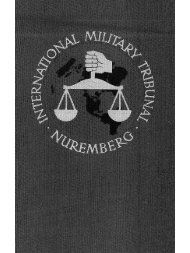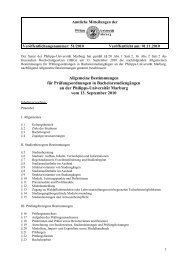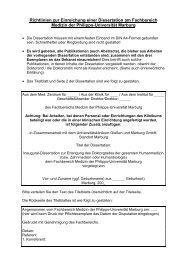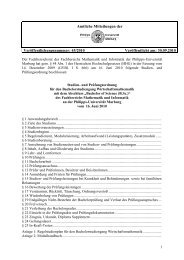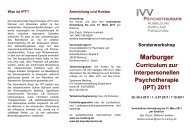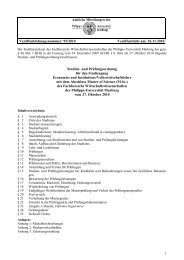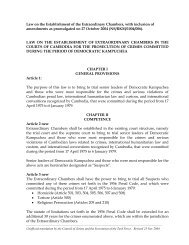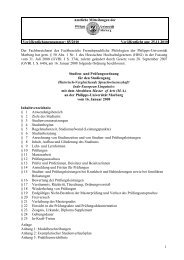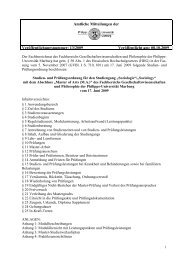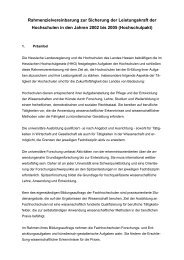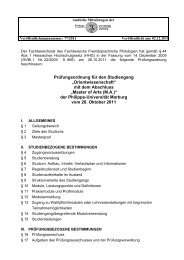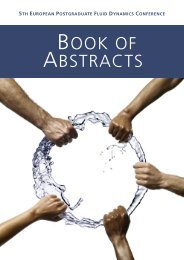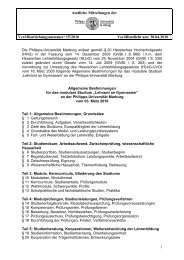- Page 1 and 2: UNITED NATIONS International Tribun
- Page 3 and 4: B. The Prosecution appeals ........
- Page 5 and 6: B. Background .....................
- Page 7 and 8: I. INTRODUCTION 1. The Indictment a
- Page 9 and 10: II. GROUNDS OF APPEAL RELATING TO A
- Page 11 and 12: the principle set forth in the Alek
- Page 13 and 14: 19. The Appeals Chamber found that
- Page 15 and 16: application of a wrong legal princi
- Page 17 and 18: 4. The Nature of the Conflict After
- Page 19 and 20: ICJ in Nicaragua, and the “specif
- Page 21 and 22: ecause the FRY remained the control
- Page 23 and 24: […] Article 4 of Geneva Conventio
- Page 25 and 26: on the Vienna Convention in support
- Page 27 and 28: As observed above, however, the nat
- Page 29 and 30: placed on formal legal bonds, which
- Page 31 and 32: protected persons by virtue of the
- Page 33 and 34: purpose of the Geneva Conventions.
- Page 35 and 36: 104. It is irrelevant to determine
- Page 37 and 38: eplacement of a State by several ot
- Page 39 and 40: III. GROUNDS OF APPEAL RELATING TO
- Page 41 and 42: issue, the arguments were extensive
- Page 43 and 44: the Hague Regulations and internati
- Page 45: 132. The Appeals Chamber is similar
- Page 49 and 50: expression to elementary considerat
- Page 51 and 52: fundamental standards appearing in
- Page 53 and 54: within the scheme providing for ind
- Page 55 and 56: 164. This interpretation is support
- Page 57 and 58: conflicts would ignore the very pur
- Page 59 and 60: IV. GROUNDS OF APPEAL CONCERNING CO
- Page 61 and 62: 189. It is necessary to consider fi
- Page 63 and 64: Judgement to this effect. 254 The s
- Page 65 and 66: commander for the entire period of
- Page 67 and 68: The Defence is not disputing that t
- Page 69 and 70: 4. Conclusion 214. For the foregoin
- Page 71 and 72: […] may possess the mens rea for
- Page 73 and 74: found that the circumstances demons
- Page 75 and 76: 231. The anticipated elucidation an
- Page 77 and 78: 237. The Prosecution contends that
- Page 79 and 80: perpetrator to be part of a subordi
- Page 81 and 82: 247. The Prosecution’s argument r
- Page 83 and 84: Prosecution does not argue that any
- Page 85 and 86: may result in criminal liability.
- Page 87 and 88: Prosecution was not uniform on this
- Page 89 and 90: find that powers of influence are s
- Page 91 and 92: not put forward anything which woul
- Page 93 and 94: ebut the defence evidence identifie
- Page 95 and 96: (ii) the delay likely to be caused
- Page 97 and 98:
Between late 1996 and early 1997, t
- Page 99 and 100:
that the Trial Chamber will exercis
- Page 101 and 102:
This submission is disingenuous. Th
- Page 103 and 104:
297. Turning to the Trial Chamber
- Page 105 and 106:
304. The Appeals Chamber acknowledg
- Page 107 and 108:
did not find beyond reasonable doub
- Page 109 and 110:
crimes for which the Prosecution se
- Page 111 and 112:
Mucic also challenges the Trial Cha
- Page 113 and 114:
where the provisions of Article 43
- Page 115 and 116:
party to the conflict in such circu
- Page 117 and 118:
B. The Prosecution appeals 331. As
- Page 119 and 120:
that individual criminal liability
- Page 121 and 122:
detainees, fails to do so despite k
- Page 123 and 124:
degree which would establish primar
- Page 125 and 126:
352. The Trial Chamber therefore co
- Page 127 and 128:
358. The Appeals Chamber considers
- Page 129 and 130:
does not accept this submission. As
- Page 131 and 132:
y Muci} provide no assistance on th
- Page 133 and 134:
Thus the Trial Chamber appears to h
- Page 135 and 136:
arrival at the ^elebi}i camp, 601 a
- Page 137 and 138:
VI. MULTIPLE CONVICTIONS BASED ON T
- Page 139 and 140:
of this Tribunal and the ICTR, and
- Page 141 and 142:
conduct, based on numerous differen
- Page 143 and 144:
war crimes.” 642 In the Trial of
- Page 145 and 146:
417. The definition of “protected
- Page 147 and 148:
422. The first pair of double convi
- Page 149 and 150:
Again, the sole distinguishing elem
- Page 151 and 152:
Count 37: dismissed Count 46: uphel
- Page 153 and 154:
VII. DELIC GROUNDS OF APPEAL ALLEGI
- Page 155 and 156:
would kill anyone who dared to remo
- Page 157 and 158:
else was in the area who could have
- Page 159 and 160:
It is clear from this evidence that
- Page 161 and 162:
459. The Appeals Chamber is satisfi
- Page 163 and 164:
facts and reach a judgement”. 715
- Page 165 and 166:
474. Delic points out that the Tria
- Page 167 and 168:
afterwards. The Trial Chamber appea
- Page 169 and 170:
It is reasonable to assume that the
- Page 171 and 172:
the Trial Chamber was in the best p
- Page 173 and 174:
nature of the evidence before it. 7
- Page 175 and 176:
discriminatory intent. 780 The Tria
- Page 177 and 178:
F. Issues 17 and 18: Convictions Un
- Page 179 and 180:
influence Hazim Delic had in the Ce
- Page 181 and 182:
injuries and more complications, if
- Page 183 and 184:
the camp. Therefore, a reasonable t
- Page 185 and 186:
530. In the Exclusion Decision, the
- Page 187 and 188:
535. In addition, it noted that: Mu
- Page 189 and 190:
Rule 95 No evidence shall be admiss
- Page 191 and 192:
was irrevocably tainted, at least i
- Page 193 and 194:
counsel present. 879 This right is
- Page 195 and 196:
desire to have counsel present duri
- Page 197 and 198:
560. However, it is clear to the Ap
- Page 199 and 200:
IX. DIMINISHED MENTAL RESPONSIBILIT
- Page 201 and 202:
occasion, Landžo poured gasoline o
- Page 203 and 204:
He argued that “diminished capaci
- Page 205 and 206:
D. Does Diminished Responsibility C
- Page 207 and 208:
586. The partial defence of diminis
- Page 209 and 210:
upon diminished mental responsibili
- Page 211 and 212:
X. SELECTIVE PROSECUTION 596. Land
- Page 213 and 214:
International Tribunal is made conc
- Page 215 and 216:
such as, inter alia, race, colour,
- Page 217 and 218:
to except the one Muslim defendant
- Page 219 and 220:
XI. JUDGE KARIBI-WHYTE 620. Landžo
- Page 221 and 222:
Supplementary Brief filed on behalf
- Page 223 and 224:
said, firmly, that Judge Karibi-Why
- Page 225 and 226:
Although this rule was not in force
- Page 227 and 228:
ultimately preferred by the review
- Page 229 and 230:
had responded that “the matter wa
- Page 231 and 232:
648. When the documents prepared by
- Page 233 and 234:
the Secretary-General that these th
- Page 235 and 236:
657. On the other hand, the Prosecu
- Page 237 and 238:
qualifications and disqualification
- Page 239 and 240:
Article 160, wishes to stand for th
- Page 241 and 242:
673. However, if the submission tha
- Page 243 and 244:
National Consensus] have such disag
- Page 245 and 246:
684. The fair-minded observer would
- Page 247 and 248:
as national law. They are represent
- Page 249 and 250:
XIII. JUDGE ODIO BENITO AND THE VIC
- Page 251 and 252:
torture and their relatives - the A
- Page 253 and 254:
of definitive code for matters aris
- Page 255 and 256:
that justice must be seen to be don
- Page 257 and 258:
714. Before turning to consider the
- Page 259 and 260:
Although this will be considered fu
- Page 261 and 262:
Prosecution submits that “the App
- Page 263 and 264:
concurrently. 1237 As a result, the
- Page 265 and 266:
discussion of the factors relevant
- Page 267 and 268:
commission of subsequent crimes, an
- Page 269 and 270:
742. The Appeals Chamber is satisfi
- Page 271 and 272:
of criminal responsibility which we
- Page 273 and 274:
in Belgium, 1270 up to twenty years
- Page 275 and 276:
discusses further below 1275 compar
- Page 277 and 278:
The Prosecution does not, however,
- Page 279 and 280:
argument on the basis that the matt
- Page 281 and 282:
choice of a concurrent rather than
- Page 283 and 284:
and the fate of the vulnerable deta
- Page 285 and 286:
all, unlike the corresponding provi
- Page 287 and 288:
786. With regard to Mucic’s condu
- Page 289 and 290:
assessment of Mucic’s character a
- Page 291 and 292:
oth Field Marshall von Leeb and Mr.
- Page 293 and 294:
weight to deterrence as a factor in
- Page 295 and 296:
Counts 11 and 12: the cruel treatme
- Page 297 and 298:
812. The Prosecution summarises its
- Page 299 and 300:
former Yugoslavia and, further, tha
- Page 301 and 302:
E. Esad Land‘o 826. The Appeals C
- Page 303 and 304:
een killed had he disobeyed the ord
- Page 305 and 306:
sentence. This has already been not
- Page 307 and 308:
oader context of the conflict in th
- Page 309 and 310:
G. Conclusion 851. For the reasons
- Page 311 and 312:
For the foregoing reasons: XV. DISP
- Page 313 and 314:
Done in English and French, the Eng
- Page 315 and 316:
Whether the Trial Chamber erred in
- Page 317 and 318:
to depend upon whether offences ari
- Page 319 and 320:
selective exercise directed by a po
- Page 321 and 322:
not purport to provide a solution t
- Page 323 and 324:
purpose of determining whether the
- Page 325 and 326:
elements, and convictions could not
- Page 327 and 328:
its application, for example a regi
- Page 329 and 330:
40. It would appear to follow, from
- Page 331 and 332:
our differences from the majority,
- Page 333 and 334:
2. The determination of which of th
- Page 335 and 336:
unusually cruel nature that the off
- Page 337 and 338:
a Grave Breach of Geneva Convention
- Page 339 and 340:
concurrent rather than consecutive
- Page 341 and 342:
4. On 15 June 1999, the Appeals Cha
- Page 343 and 344:
Issue Number Three: Whether Deli} c
- Page 345 and 346:
8. The Trial Chamber erred in law a
- Page 347 and 348:
4. Hearing 15. The Appeals Chamber
- Page 349 and 350:
egarded as an application to the Pr
- Page 351 and 352:
1. Provisional Release 29. Muci} fi
- Page 353 and 354:
D. Issues Relating to Evidence 1. M
- Page 355 and 356:
Conduct for Defence Counsel appeari
- Page 357 and 358:
Ground of Appeal; 112 ii) rejected
- Page 359 and 360:
ANNEX B - GLOSSARY OF TERMS Additio
- Page 361 and 362:
and Other Serious Violations of Int
- Page 363 and 364:
Tadi} Jurisdiction Decision Prosecu



